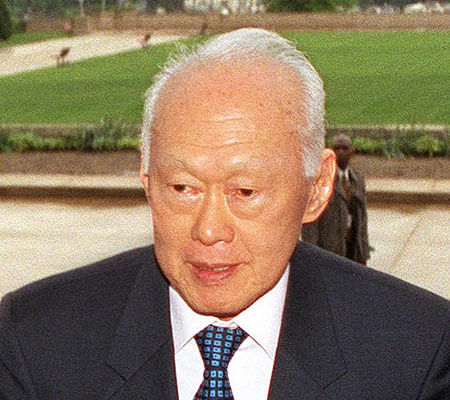In tributes to Singapore’s recently passed founding father, Lee Kuan Yew, much was made of the (undeniable) gains in prosperity and standards of living among the people under his strictly “managed” pseudo-democracy, as well as of how happy most residents are with their quality of life and the safety and cleanliness of their little country.

The late Lee Kuan Yew, Prime Minister of Singapore, 1959-1990; cabinet member, 1990-2012. (U.S. Government photo, 2002)
The logical extension of these commentaries has been to ask whether the success of this (almost literally) shining city on a busy coast means democracy isn’t the best way to produce a “government for the people” that actually governs well. Despite the name of this site, I’m open-minded enough to at least consider the possibility that there are other forms of government that might be equally (or even better) suited to a given society’s governance. I don’t presume to assert with certainty that Western liberal democracy is positively the be-all/end-all or the universally applicable ideal. But let’s not get too carried away by Lee Kuan Yew and the Singapore story and draw overly broad conclusions in the opposite direction either.
For a start, some of the quality of life and law enforcement issues are actually more controversial than the glowing tributes from around the world would imply; things are pretty rigid and harsh sometimes. Even the reported happiness, according to Singaporean commentator Sun Xi in a November 2013 article in The Globalist, is debatable…
But for the sake of argument, let’s stipulate that his governance of Singapore was predominantly very good and served the public interest well, despite the lack of free, fair, and open elections. Let’s say that model worked effectively in Singapore. Would that really be enough to argue credibly that Lee Kuan Yew’s legacy might undermine liberal representative democracy’s claims to serving the public interest most effectively (and therefore governing on behalf of the people best)?
I would suggest not. There’s a major component missing in such analyses. It is probably far easier to have an effective and responsive yet non-democratic government if there is also broad/near-universal agreement in that specific society about the goals and purposes of government. Democracy is less “necessary,” so to speak, for effective governance in the public interest if everyone in a society more or less agrees on what their government should be doing and what an ideal society would look like. If everyone agrees, the government just has to do those things well, and it will have succeeded. That agreement is likelier to be found in a small place like Singapore. In a vaster and more politically or culturally heterogeneous society, such as the United States, democracy is necessary to provide a stable and peaceful mechanism for sorting out competing fundamental visions of governance.
Read more




